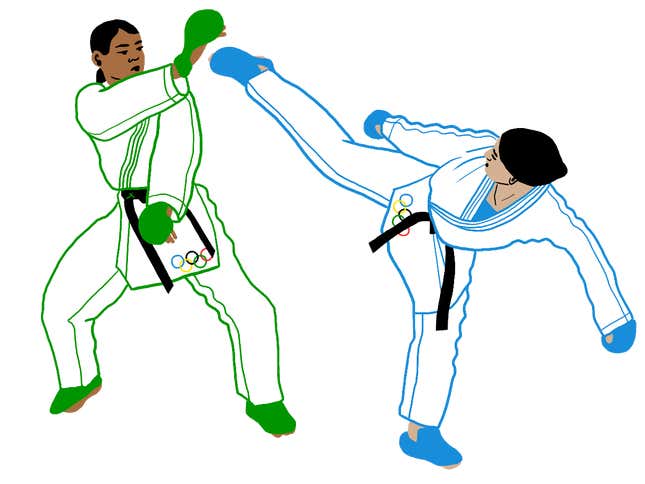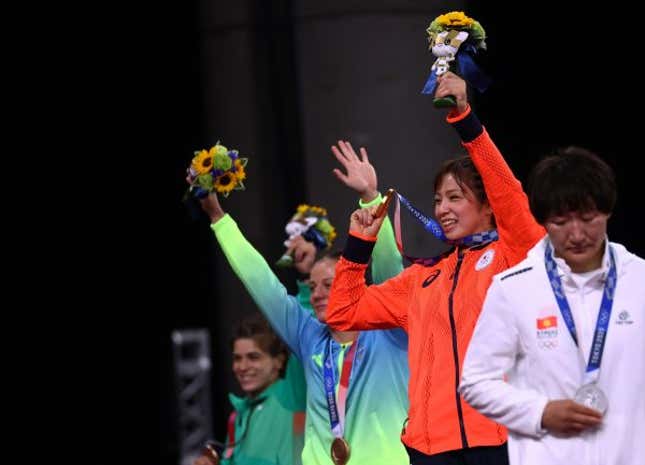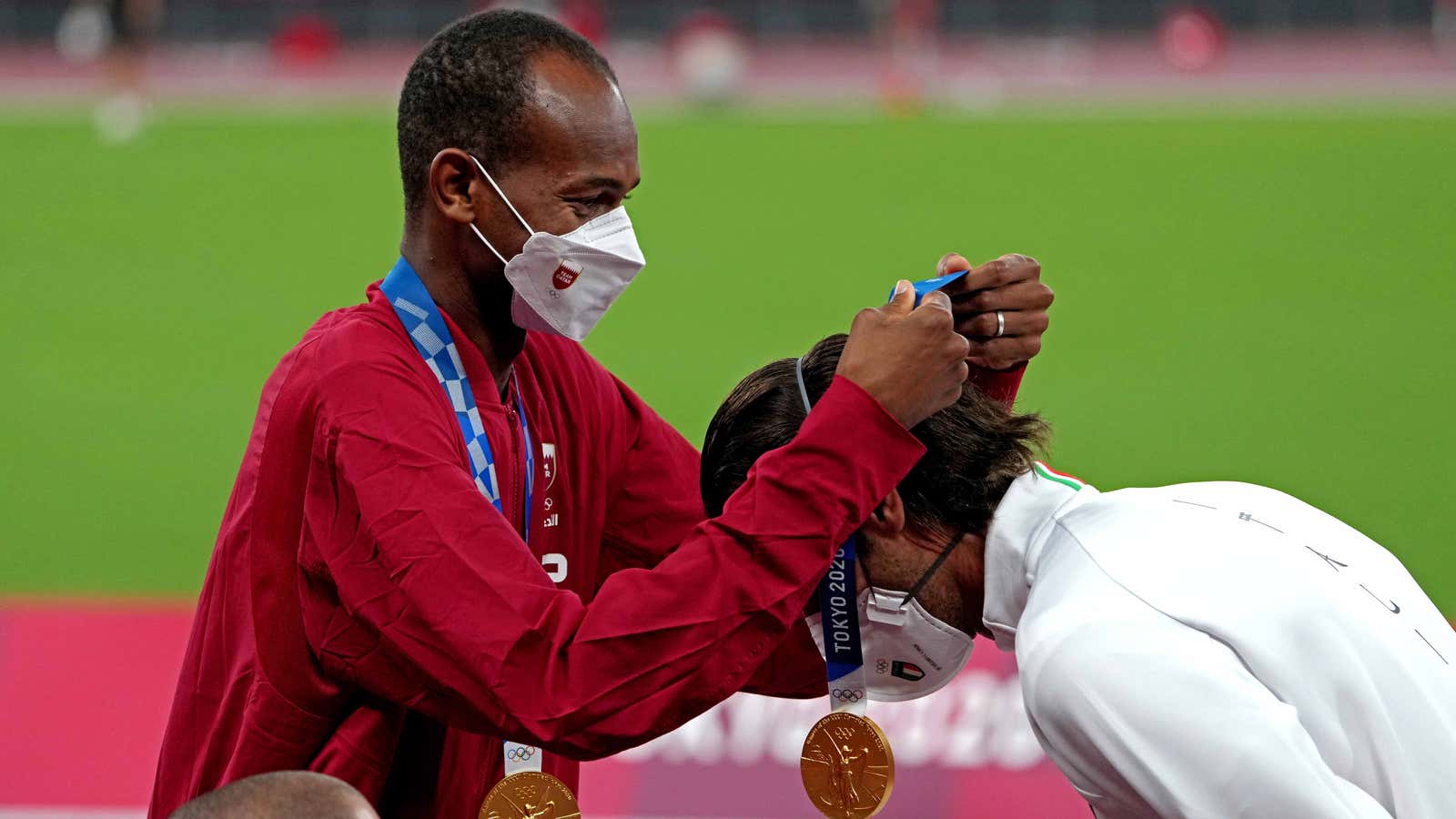Hi Quartz readers!
We’re on the home stretch now with just four days left, though don’t give in too hard to your post-Olympic letdown—the Paralympics are just around the corner. Meanwhile, the world kept turning, and we can keep you up to date with the news in the Quartz Daily Brief.
Highlight reel
- World records were broken twice over at the women’s 400m hurdles, with US runners Sydney McLaughlin and Dalilah Muhammad taking gold and silver, respectively.
- The US women’s volleyball team beat the Dominican Republic’s in a blistering quarterfinal match, despite the absence of starters Jordan Thompson and Jordyn Poulter, both out with injuries.
- Canadian Andre de Grasse won gold in the men’s 200m, the first Canadian to do so since 1928.
- ROC artistic swimmer Svetlana Romashina won her sixth gold (a record for the sport) in a somewhat terrifying spider-themed duet with Svetlana Kolesnichenko.
- The Olympic Village has its first confirmed cluster of Covid-19 infections, among the Greek artistic swimming team.
Not everyone’s a winner
You will have seen the clip already by now. In the men’s high jump in Tokyo, Gianmarco Tamberi of Italy and Mutaz Barshim of Qatar are tied, and an official approaches them to ask about a jump-off to settle the winner. Instead, the two athletes—fast friends—leap into each other’s arms in celebration. “Sharing with a friend is even more beautiful,” Tamberi said. It was a moment to moisten the eye and warm the heart.
Except: Was it the Olympian thing to do? The Games are about the purity and thrill of the sporting contest. In deciding that neither needed to settle for silver, they fetishized gold and invalidated the contest. Not for them the indignity of being the second-best high-jumper in the world, they decided.
These Olympics have raised profound questions about the nature of athletic victory. In the case of Simone Biles and Naomi Osaka, we’ve recognized afresh that there are more important things than winning: mental wellness, inner peace, physical safety. But competing also means someone will win, and maybe the beauty of the Olympics comes out of this honest contest, not off-track agreements to share gold. Winning isn’t everything, but it’s also not nothing. —Samanth Subramanian
By the digits
15: Athletes from African countries who went missing at the 2012 London Olympics—several of them later requested asylum in the UK
$30,000: Portion of US gold-medal wrestler Tamyra Mensah-Stock’s $37,500 bonus from the US Olympic and Paralympic Committee she plans to give to her mom so she can buy a food truck
80 tons: Total weight of the recycled electronics that were turned into the 2020 Games’ medals
100%: Share of the Games powered by renewable energy
$3,400: Funds Israeli baseball pitcher Ben Wanger has raised (so far) for victims of the landslide in Atami, Japan. Wanger started the GoFundMe campaign following backlash for a video he posted of athletes destroying one of the Olympic Village’s cardboard beds.
Rs 200,000 ($2,700): Value of cryptocurrency Bitbns has promised to India’s gold medal winners; it will give Rs 100,000 to silver medalists and Rs 50,000 to bronze medalists
What to watch for

The Japanese combat sport of karate makes its Olympic debut today, neatly mirroring its Korean counterpart, taekwondo, which first appeared at the 1988 Seoul Games. Along with boxing, wrestling, judo, and, arguably, fencing, there are now six combat sports at the Summer Olympics. Karate and taekwondo are fairly similar, in fact, with the former placing more emphasis on hand strikes, while the latter involves more kicking.
All karate competitors will have, of course, achieved black belt status. They compete in two forms: kata and kumite. Kata is a series of forms against an imaginary opponent—a test of technique, timing, and grace. Kumite is the actual combat, and participants are protected by padded gloves and leg gear. Unlike taekwondo and boxing, shots to the head are not permitted.
Quotable
“It does look like a person, and that’s a little spooky. You know, horses don’t want to see a guy, like, looking intense next to a jump, looking like he’s ready to fight you.” Israeli equestrian Teddy Vlock, on the life-sized sumo wrestler statue on the Olympic course that may be spooking some horses
Silver medal sadness

The next time you watch an Olympic medal ceremony, look atop the podium and notice the medalists’ facial expressions. Predictably, the gold-medal winner looks elated. Bronze probably looks thrilled, too. But what about silver? Academic studies have found that silver medalists often look sadder than their gold and bronze counterparts. Psychologists chalk up the silver and bronze reactions to counterfactual thinking—a fixation on what could have been. Bronze medalists are generally happy to have placed at all, escaping the cosmic disaster that is a fourth-place finish. Silver medalists, however, might fixate on their proximity to gold, and how close they were to ultimate glory.
Instant replay
🎮 When will esports join the Olympics?
⌚️ Wearable technology is changing the way Olympic athletes train
🥩 Anti-doping policies for athletes should consider meat contamination risks
🎵 This email was produced while listening to John Williams’s “Olympic Fanfare and Theme” and jamming out on air timpani.
Our best wishes for an inspiring day. Get in touch with us at needtoknow@qz.com and live your best Quartz life by downloading our iOS app and becoming a member. Today’s email was brought to you by Samanth Subramanian, Hasit Shah, Scott Nover, Jordan Weinstock, Liz Webber, and Susan Howson.
